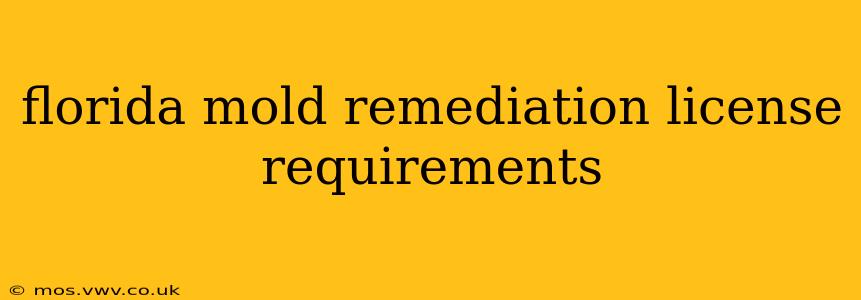Mold remediation is a serious business, impacting public health and safety. In Florida, as in many states, it's regulated to ensure qualified professionals handle mold issues effectively and responsibly. This guide details the requirements for obtaining a Florida mold remediation license. Understanding these regulations is crucial for anyone considering entering this field or hiring a remediation professional.
What are the Requirements for a Florida Mold Remediation License?
The Florida Department of Business and Professional Regulation (DBPR) oversees the licensing of mold remediators. To obtain a license, applicants must meet several key requirements:
- Application: A completed and accurate application must be submitted to the DBPR. This includes personal information, business details, and relevant experience.
- Background Check: A thorough background check is conducted to ensure applicants meet the state's standards of character and fitness. Criminal records can be a significant obstacle.
- Education & Training: Applicants must demonstrate sufficient knowledge of mold remediation techniques and safety procedures. This usually involves completing approved training courses covering topics such as mold identification, sampling protocols, containment methods, and proper disposal procedures. Specific course requirements and approved providers are listed on the DBPR website.
- Examination: A state-mandated exam tests the applicant's understanding of the relevant regulations, best practices, and technical aspects of mold remediation. Passing this exam is mandatory for licensure.
- Insurance: Applicants must demonstrate proof of liability insurance to protect themselves and their clients from potential financial losses. The required coverage amount is specified by the DBPR.
- Fees: Various application and licensing fees are payable to the DBPR as part of the application process. These fees are subject to change.
What Type of Training is Required for Mold Remediation in Florida?
Approved Training Courses:
Florida mandates completion of specific mold remediation training courses. These courses typically cover:
- Mold identification and sampling: Learning to differentiate between various mold species and correctly collect samples for lab analysis.
- Safety protocols: Understanding and implementing safety procedures to protect workers and occupants from potential health risks associated with mold exposure. This includes proper use of personal protective equipment (PPE).
- Containment methods: Learning how to effectively contain mold during remediation to prevent its spread to other areas of the building.
- Remediation techniques: Mastering different techniques used in mold removal, from surface cleaning to demolition and reconstruction.
- Disposal procedures: Understanding the environmentally safe and legally compliant disposal of mold-contaminated materials.
What if I Already Have a Related License in Florida?
Some existing Florida licenses might offer pathways to mold remediation licensure. However, you still need to check with the DBPR for specific requirements. This could involve additional education, examinations, or other qualifications.
How Much Does a Florida Mold Remediation License Cost?
The costs involved in obtaining a Florida mold remediation license vary. They include application fees, examination fees, background check costs, training course fees, and insurance premiums. The DBPR website provides the most up-to-date information on these fees. It's crucial to factor in all these expenses when planning your application.
How Long Does it Take to Get a Mold Remediation License in Florida?
The processing time for a Florida mold remediation license application depends on several factors, including the completeness of the application and the time it takes to complete background checks. It is advisable to allow ample time for the application process. Directly contacting the DBPR is recommended for current processing time estimates.
What are the Continuing Education Requirements for Maintaining My License?
Florida usually mandates continuing education to maintain a mold remediation license. The exact requirements regarding the number of hours and specific courses will be stipulated by the DBPR and are subject to change. Staying informed about these continuing education needs is crucial for license renewal.
Remember, always refer to the official Florida Department of Business and Professional Regulation (DBPR) website for the most current and accurate information on licensing requirements and regulations. This guide provides a general overview and should not substitute for official DBPR guidance.
